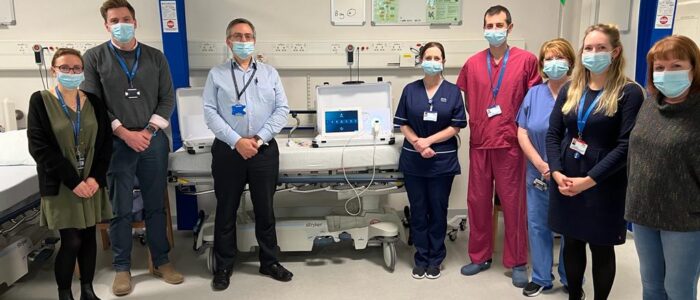Forth Valley Royal’s Endoscopy Unit Leads the Way
The Endoscopy Unit at Forth Valley Royal Hospital has become the first in Scotland to introduce the use of a new digital probe which could improve diagnosis as well as avoid the need for a colonoscopy to help reduce waiting lists.
The LumenEye® X1 device enables colorectal surgeons and nurse endoscopists to examine patients referred with a number of symptoms, including rectal bleeding, and carry out follow up checks in patients who have undergone bowel surgery.
LumenEye is a small digital endoscope with a full HD camera and light to capture clear images and videos of the lower gastrointestinal tract. It is a portable and versatile device, giving it the potential to be used in a variety of healthcare settings, including outpatient clinics and operating theatres. The high-definition images and videos obtained can be viewed live during an examination, via a video link or uploaded and reviewed by a colorectal consultant to help make a diagnosis and advise on any further treatment or investigations required.
It can help quickly identify a number of common conditions including polyps, inflammation and haemorrhoids so that many patients do not need to undergo further investigations such as a colonoscopy, helping to free up diagnostic capacity for those with more serious conditions such as cancer and other bowel diseases.
NHS Forth Valley, Consultant General and Colorectal Surgeon and Colorectal Cancer Lead, Mr John Camilleri-Brennan, said “The Surgical and Endoscopy Units at NHS Forth Valley have a strong track record of embracing innovation and advances in technology for the benefit of patients. “The versatility of the new LumenEye device enables us to obtain a timely and accurate diagnosis of diseases of the rectum, as well as actively improve the efficiency of bowel surgery. The service also has the potential to reduce the number of patients who require a colonoscopy and help reduce waiting times.”
NHS Forth Valley is also the only site in Scotland involved in a national research project, called the the LuCID study, which is assessing the potential to use the LumenEye® X1 device in GP Practices to help reduce the number of patients referred to hospital for colonoscopies and other investigations.


